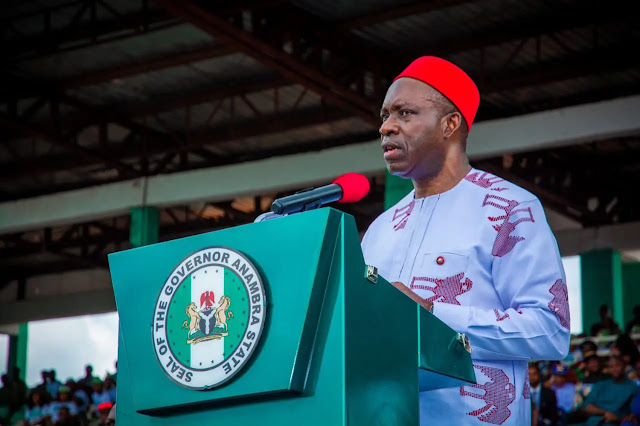The Anambra State Government has taken decisive steps to transform the state’s industrial sector, focusing on improved infrastructure, pro-business policies, and increased access to financing for local enterprises.
Speaking at a meeting of the National Agency for Science and Engineering Infrastructure (NASENI) in Awka on Monday, Christian Udechukwu, Anambra’s Commissioner for Industry, outlined the government’s comprehensive efforts to tackle critical industrial challenges, particularly power supply shortages.
Revolutionizing Power Supply for Industries
Udechukwu emphasized that unreliable and expensive electricity has significantly hampered industrial growth, forcing many businesses to shut down. He reaffirmed the state’s commitment to solving this crisis by implementing sustainable power solutions that would provide industries with electricity at far lower rates than currently available.
“We are working tirelessly to resolve power supply issues, and we believe Anambra can set a national example in power production, energy diversity, cost efficiency, and reliability,” he stated.
To achieve this, Governor Chukwuma Soludo’s administration has spearheaded the creation of a power regulatory agency in the state. The bill establishing this agency has already passed its second reading at the State House of Assembly, signaling strong political will to drive the initiative forward.
Local Industries at the Forefront
Beyond power reforms, the government is championing policies that promote local manufacturing and reduce dependence on imported goods. Commissioner for Information, Law Mefor, has proposed a groundbreaking policy mandating public officers to use only Made-in-Nigeria products. He argued that such a measure would strengthen domestic industries, improve the economy, and elevate Nigeria’s global reputation.
“If we are serious about boosting our economy, we must start from within. Public officials should lead by example by using locally-made goods, which will in turn create jobs, stimulate demand, and support innovation,” Mefor asserted.
Challenging Perceptions of Locally-Made Products
Oluwaseyi Ogungbenro, a representative of NASENI’s Electronics Development Institute, expressed concern over the negative perception of Nigerian-made products. Despite government initiatives to promote local manufacturing, many consumers still prefer foreign alternatives, often assuming them to be of superior quality.
However, Ogungbenro debunked this belief, asserting that many Nigerian products are more durable and better suited for local conditions than their imported counterparts.
“Nigerian-made products have repeatedly proven to be of high quality and longevity, yet the bias towards foreign goods persists. Changing this perception is crucial to fostering a thriving manufacturing sector,” he said.
NASENI, he added, remains committed to driving technological advancements, encouraging innovation, and implementing science-backed solutions to propel economic growth.
A New Dawn for Anambra’s Industrial Sector
With bold initiatives in power reform, investment-friendly policies, and a renewed push for local production, Anambra State is positioning itself as a leader in Nigeria’s industrial transformation. The government’s proactive steps are expected to not only revive struggling businesses but also attract new investments, fostering a self-sustaining economic ecosystem.
If successfully implemented, these policies could make Anambra a model for other states, demonstrating that strategic governance, innovation, and local industry support can drive lasting economic progress.













![Content Creator Angelica Kelechi Speaks Out on Alleged Sexual Assault at Khloe Abiri’s Spa [VIDEO]](https://blogger.googleusercontent.com/img/b/R29vZ2xl/AVvXsEgQStip4cn2DAOvQ2hNFU30OAFWoxfQIDOnStd0uVgwwxKrFAQYYvtFni6QV04OGP8dyKk5TCAhXM5es9linl1ClhjPzaazz2tTt0LmJ5lFVe5202o2McF9QROT1v2hEyNTdY-M1KRuLTY6OqqysKNfcsY5bCtwCIP8wEQ4AXcfQfTaXWWZiixqf82NDH5a/w72-h72-p-k-no-nu/abiri-khloe123.jpg)


![Bello El-Rufai Questions Discrepancy As Boko Haram Terrorist Gets 20Years While Nnamdi Kanu Receives Life Sentence [VIDEO]](https://blogger.googleusercontent.com/img/b/R29vZ2xl/AVvXsEiWSu8zIQCe1XyQUKpvkUYY03fJRFWUlJkrlvEZioStBVV0gT0uVjMg64uBqblrA0aTyaQ4RD8mhelxNq7VGPBtsNFzDl9sS880MvdKXa2d964PDDf9atDRlVMzCw2qE7vtqGj1NNyq2IVC6d3c4qqdeGP6QgwPUInkpB3rWonFU75SMJfs-ql5uH7IzchQ/w72-h72-p-k-no-nu/Bello-El-rufai1123.jpg)



0 Comments
Hey there! We love hearing from you. Feel free to share your thoughts, ask questions, or add to the conversation. Just keep it respectful, relevant, and free from spam. Let’s keep this space welcoming for everyone. Thanks for being part of the discussion! 😊